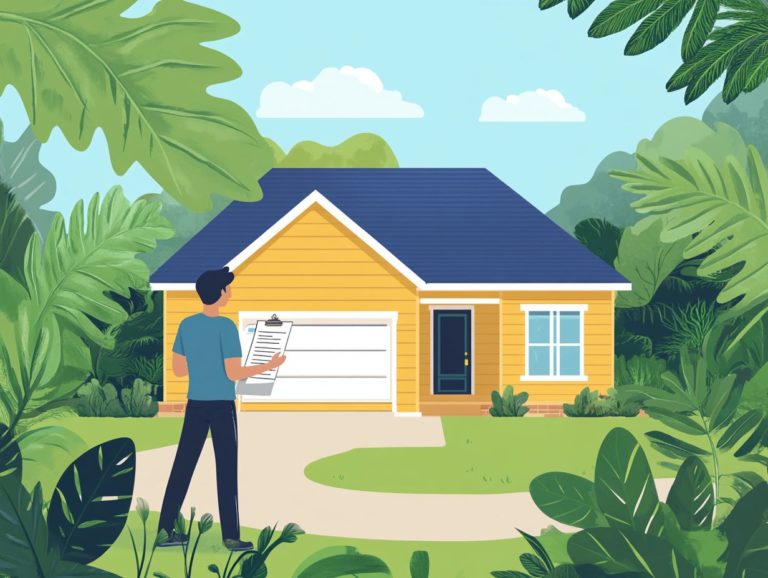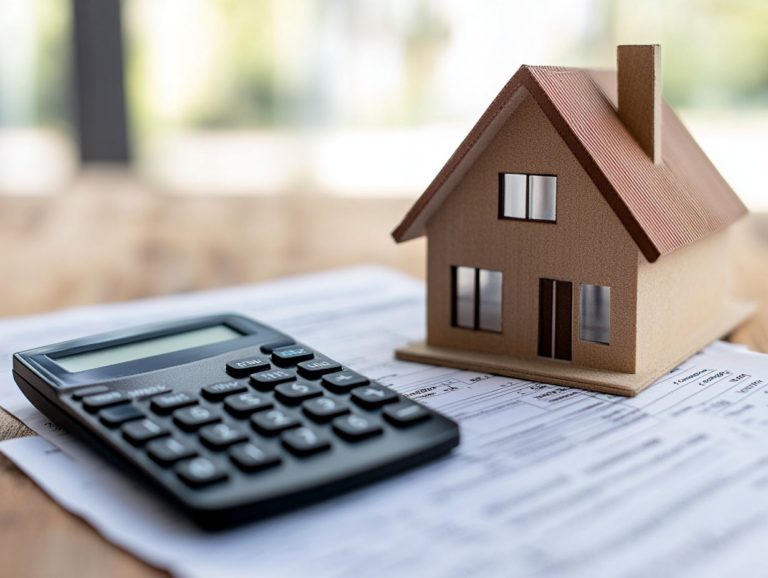What Are Closing Costs?
Understanding closing costs is essential for anyone on a real estate journey, whether buying or selling a property. These costs can significantly impact your budget and the transaction process.
This article breaks down what closing costs entail, explores various expenses, clarifies who is responsible for these fees, and discusses what influences their amounts.
You’ll discover tips to lower these costs, insights into the Closing Disclosure, and the essential documents you may encounter. Get ready to tackle these important costs with confidence!
Contents
Key Takeaways:

Closing costs are the fees and expenses paid during the process of buying or selling a home. Both buyers and sellers are responsible for specific closing costs based on location and property type.
Negotiating with lenders and sellers can help lower closing costs. Understanding the closing process and reviewing all documents carefully is crucial.
Understanding Closing Costs
For first-time homebuyers, understanding closing costs is important. These costs can significantly affect your overall expenses.
Closing costs include various fees and expenses that buyers and sellers manage during the closing process, such as:
- Loan origination fees
- Appraisal fees
- Title insurance
- Homeowners insurance
- Private mortgage insurance
Knowing what to expect prepares you to make informed financial decisions and avoid surprises on closing day.
Types of Closing Costs
Understanding the types of closing costs is vital as they can vary significantly. These costs typically include:
- Loan origination fees
- Appraisal fees
- Title insurance
- Homeowners insurance
- Private mortgage insurance
- Mortgage points
- Property taxes
- Escrow fees
- Attorney fees
- Miscellaneous charges
Seller concessions can help alleviate some financial burdens. Being informed gives you the confidence to approach your home purchase with clarity.
Common Expenses and Fees
Common expenses tied to closing costs include various charges that buyers or sellers should be aware of. These charges can catch newcomers off guard, which emphasizes the need for understanding.
Loan origination fees cover the lender s costs to process your loan, while appraisal fees determine your home s value. Title insurance protects you from legal claims, and homeowners insurance guards against damage.
If you re putting down less than 20%, you may need private mortgage insurance, adding to your monthly payments. Other expenses include escrow fees for managing funds and attorney fees for legal guidance.
Seller concessions can provide some relief by allowing you to negotiate a portion of these expenses.
Who Pays for Closing Costs?

Determining who pays closing costs is a key element of the home buying journey. This financial responsibility often falls on both buyers and sellers.
Typically, buyers handle most of these costs, which include:
- Loan origination fees
- Appraisal fees
- Title insurance
Sellers can ease the burden through seller concessions. Open and honest communication among buyers, sellers, and real estate agents ensures a smooth transaction.
Responsibility of Buyer and Seller
The responsibilities regarding closing costs can lead to negotiations tailored to your transaction. Typically, buyers bear most closing costs, including appraisal fees and homeowners insurance.
Sellers may offer concessions to ease your financial burden. This division of responsibility is vital for a smooth closing process.
Understanding these roles impacts your ability to reach a fair agreement. Your obligations often include property taxes and mortgage insurance, so strategic budgeting is essential.
Sellers might cover a portion of closing costs to make their property more attractive, especially in competitive markets. This negotiation aspect shapes the final distribution of costs and fosters goodwill.
Factors that Affect Closing Costs
Many factors impact closing costs during a home purchase, with location and property type at the forefront. States like Delaware, New York, and Missouri have varying fees due to local regulations.
Loan origination practices from mortgage lenders and appraisal outcomes also influence the costs. Conduct thorough research on these aspects for a smoother purchase experience.
Location, Property Type, and Other Considerations
Location and property type significantly influence closing costs throughout the home-buying journey. For instance, metropolitan areas with high property values, like Washington, D.C., face elevated closing costs due to higher appraisal fees and local regulations.
If you’re looking at properties in rural areas, such as parts of Texas or Ohio, you may find lower closing costs due to simpler regulations. Different property types, like condos or single-family homes, also have unique implications for closing expenses.
Buying a condominium may involve additional fees tied to association requirements. Understanding these distinctions is crucial for effective financial planning.
How to Lower Your Closing Costs

Lowering closing costs is vital for maximizing savings during your home buying journey. Effective negotiation is key to achieving this goal.
You can negotiate with lenders about various fees tied to your mortgage, such as loan origination fees. Discussing potential seller concessions can also help ease your financial burden at closing.
By taking a proactive stance, you can significantly lower your overall closing costs and make homeownership more attainable!
Negotiating with Lenders and Sellers
Negotiating with lenders and sellers is a powerful strategy to lower your closing costs. This can lead to significant savings during the home buying process.
Equip yourself with knowledge about common fees, such as appraisal, inspection, and title insurance. These often have some wiggle room for negotiation.
For instance, when discussing loan origination fees, leverage competing lender quotes to encourage a reduction.
When negotiating with a seller, request concessions to cover specific fees related to home inspections or repairs. This can effectively ease your financial burden.
By being informed and assertive, you empower yourself and foster a collaborative atmosphere. This approach can unlock fantastic terms that enhance your overall purchasing experience.
Closing Disclosure and Other Important Documents
The Closing Disclosure and other important documents play a critical role in your home buying journey. They equip you with essential insights into closing costs and your financial responsibilities.
The Closing Disclosure details all fees and expenses related to the closing. This enables you to verify and compare these figures against the initial loan estimate you received.
Grasping the nuances of these documents is important to ensure a seamless closing experience and to avoid any unwelcome surprises on closing day.
What to Expect During the Closing Process
Understanding what to expect during the closing process is essential for feeling prepared and confident as you finalize your home purchase. This process typically involves reviewing the Closing Disclosure and other documents, allowing you to confirm all closing costs and ensure accuracy.
Familiarizing yourself with these documents can help you navigate the final steps with ease, minimizing stress. Examining the Closing Disclosure is crucial, as it outlines the terms of your loan, itemizes all closing costs, and shows how much money you’ll need at closing.
You should feel empowered to ask questions or seek clarification on any confusing items. Engaging with a real estate agent or attorney at this stage can provide valuable insights and support.
Ultimately, a clear understanding of these key steps boosts your confidence and protects you from unexpected surprises, ensuring a smoother transition into homeownership.
Frequently Asked Questions

What are closing costs and why do I have to pay them?
Closing costs are the fees associated with the purchase of a home or property. They are paid at the “closing” of the real estate transaction and cover various expenses such as title insurance, appraisal fees, and legal fees.
How much are closing costs?
The amount of closing costs varies based on the location and price of the property, as well as the specific fees required by the lender and title company. On average, closing costs range from 2-5% of the total purchase price.
Do I have to pay all closing costs upfront?
In most cases, yes. Closing costs are typically due at the time of closing. However, some lenders may offer the option to roll the closing costs into the mortgage loan or negotiate for the seller to pay a portion of the costs.
What fees are included in closing costs?
Closing costs can include a variety of fees such as appraisal fees, title search and insurance, loan origination fees, home inspection fees, and prepaid property taxes and insurance. Your lender should provide a breakdown of all closing costs.
Are closing costs necessary if I am paying cash for the property?
Yes, closing costs are still necessary even if you are paying cash for the property. While you may not have to pay loan-related fees, other fees such as title insurance and appraisal fees may still be required at closing.
Can I negotiate closing costs?
Yes, you can negotiate some closing costs with the seller or lender. However, some fees, such as government recording fees and transfer taxes, are non-negotiable. It’s important to review the closing costs carefully and understand which fees are negotiable before entering negotiations.






